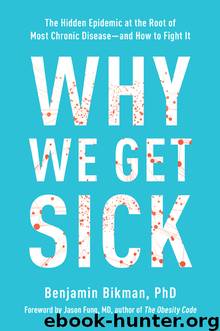Why We Get Sick by Benjamin Bikman

Author:Benjamin Bikman
Language: eng
Format: epub, azw3
ISBN: 9781950665174
Publisher: BenBella Books, Inc.
Published: 2020-05-10T16:00:00+00:00
CHAPTER 15
Eat Smart: The Evidence on the Food We Eat
WE HAVE NOW ARRIVED at what is the most powerful part of the solution in the fight against insulin resistance: the food we eat. The most powerful but also the most difficult to change. So much has been written about this in recent decades, so for me, exploring the benefits to insulin sensitivity as a consequence of altering the diet required a thoughtful and deliberate analysis of published research. The results of such an analysis led me to one unavoidable conclusion: when it comes to diet, we got it wrong.
The epidemics of obesity and insulin resistance are partly the product of bending science to fit politics. As documented thoroughly by Gary Taubes (Good Calories, Bad Calories) and Nina Teicholz (The Big Fat Surprise), in the 1950s and 1960s, a political consensus was created from the limited (and highly debated) data suggesting dietary fat, particularly saturated fat, correlated with heart disease. In remarkably little time, this correlation became considered causation, and a tentative theory become dietary dogma. Soon, we collectively learned to vilify dietary fat as the leading cause of heart disease, weight gain, and diabetes, though at the time the scientific community widely criticized this move.
At its simplest, the battle of thought between political agenda and scientific process centered around the relevance of calorie number versus calorie type in determining the ideal nutrition for good health. Supporters of calorie number argue that it’s all a matter of mathematics: if you eat fewer calories than you expend, you’ll be lean and insulin sensitive; if you eat more calories than you expend, you’ll be fat and insulin resistant. On the other side, many argue that the type of calorie is more relevant than the number; a nutrient, once consumed, affects the body’s hormones, particularly insulin, and it’s this subsequent insulin effect that drives insulin resistance, fat gain, and eventually disease.
Depending on your school of thought, then, the solution to insulin resistance is either restricting calories, which almost invariably means a low-fat diet, or restricting certain types of carbohydrates, which aims to keep insulin low. Now, I mentioned earlier that the human body is somewhat more complicated than a simple furnace, and there’s more to diet than “calories in, calories out.” Let’s take a look at the research on these varied approaches.
Download
This site does not store any files on its server. We only index and link to content provided by other sites. Please contact the content providers to delete copyright contents if any and email us, we'll remove relevant links or contents immediately.
Men In Love by Nancy Friday(4344)
Everything Happens for a Reason by Kate Bowler(4076)
The Immortal Life of Henrietta Lacks by Rebecca Skloot(3834)
Why We Sleep by Matthew Walker(3782)
The Sports Rules Book by Human Kinetics(3599)
Not a Diet Book by James Smith(2744)
The Emperor of All Maladies: A Biography of Cancer by Siddhartha Mukherjee(2440)
Sapiens and Homo Deus by Yuval Noah Harari(2424)
Day by Elie Wiesel(2252)
Endless Forms Most Beautiful by Sean B. Carroll(2089)
Angels in America by Tony Kushner(2054)
A Burst of Light by Audre Lorde(1984)
Hashimoto's Protocol by Izabella Wentz PharmD(1904)
Dirty Genes by Ben Lynch(1863)
Reservoir 13 by Jon McGregor(1860)
Stretching to Stay Young by Jessica Matthews(1719)
Fat for Fuel by Joseph Mercola(1701)
The Immune System Recovery Plan by Susan Blum(1701)
Boost Your Brain Power in 60 Seconds by Michelle Schoffro Cook(1682)
